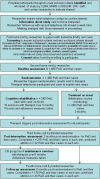Goal-oriented cognitive rehabilitation in early-stage dementia: study protocol for a multi-centre single-blind randomised controlled trial (GREAT)
- PMID: 23710796
- PMCID: PMC3680175
- DOI: 10.1186/1745-6215-14-152
Goal-oriented cognitive rehabilitation in early-stage dementia: study protocol for a multi-centre single-blind randomised controlled trial (GREAT)
Abstract
Background: Preliminary evidence suggests that goal-oriented cognitive rehabilitation (CR) may be a clinically effective intervention for people with early-stage Alzheimer's disease, vascular or mixed dementia and their carers. This study aims to establish whether CR is a clinically effective and cost-effective intervention for people with early-stage dementia and their carers.
Methods/design: In this multi-centre, single-blind randomised controlled trial, 480 people with early-stage dementia, each with a carer, will be randomised to receive either treatment as usual or cognitive rehabilitation (10 therapy sessions over 3 months, followed by 4 maintenance sessions over 6 months). We will compare the effectiveness of cognitive rehabilitation with that of treatment as usual with regard to improving self-reported and carer-rated goal performance in areas identified as causing concern by people with early-stage dementia; improving quality of life, self-efficacy, mood and cognition of people with early-stage dementia; and reducing stress levels and ameliorating quality of life for carers of participants with early-stage dementia. The incremental cost-effectiveness of goal-oriented cognitive rehabilitation compared to treatment as usual will also be examined.
Discussion: If the study confirms the benefits and cost-effectiveness of cognitive rehabilitation, it will be important to examine how the goal-oriented cognitive rehabilitation approach can most effectively be integrated into routine health-care provision. Our aim is to provide training and develop materials to support the implementation of this approach following trial completion.
Figures
References
-
- Department of Health. Quality outcomes for people with dementia: building on the work of the National Dementia Strategy. London: Department of Health; 2010.
-
- Knapp M, Prince M, Albanese E, Banerjee S, Dhanasiri S, Fernandez J-L, Stewart R. Dementia UK. London: Alzheimer’s Society; 2007.
-
- Department of Health. Living well with Dementia: A National Dementia Strategy. London: Department of Health; 2009.
-
- Clare L, Woods B, Moniz Cook ED, Spector A, Orrell M. Cognitive rehabilitation and cognitive training for early-stage Alzheimer’s disease and vascular dementia. Cochrane Database Syst Rev. 2003;4:CD003260. - PubMed
-
- Sitzer DI, Twamley EW, Jeste DV. Cognitive training in Alzheimer’s disease: a meta-analysis of the literature. Acta Psychiatr Scand. 2006;114:75–90. - PubMed
Publication types
MeSH terms
Associated data
Grants and funding
LinkOut - more resources
Full Text Sources
Other Literature Sources
Medical



